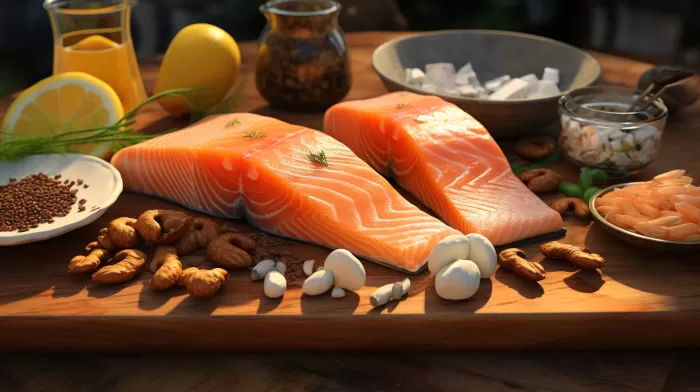Omega-3 fatty acids are essential to men’s health. They work to fight prostate cancer, protect the heart, and assist the body in insulin response. In fact, these essential fatty acids offer a range of health benefits for men, including support for enlarged prostates and prostatitis. The problem is that our bodies can’t produce omega-3s naturally, which means these essential fats must come from external sources like diet or supplementation.
Omega-3 fatty acids can be broken down into three main types: EPA (eicosapentaenoic acid), DHA (docosahexaenoic acid), and ALA (alpha-linolenic acid). Fatty fish such as salmon, anchovies, herring, sardines, and trout are rich in EPA and DHA. On the other hand, plant-based sources like walnuts, flaxseed, hemp oil, chia seeds, pumpkin seeds, and fortified foods contain ALA.
Incorporating Fish in Your Diet
Consuming fish is an essential part of maintaining a heart-healthy and prostate-friendly eating plan. Eating fish that is packed with omega-3s is a key component of the Mediterranean diet, a long-term dietary plan known for promoting good health, especially for men. However, some types of fish should be avoided altogether.
For heart disease prevention, men should steer clear of seafood high in mercury and other contaminants, such as polychlorinated biphenyls (PCBs), which have been linked to cancer and several health problems related to the immune, reproductive, nervous, and endocrine systems. Methylmercury, a form of mercury often found in fish, can cause several health issues and increase the risk of heart attacks.
Choosing the Right Fish
One major issue with potentially contaminated fish is that they can retain traces of mercury, pesticides, and antibiotics. It’s important to choose domestic seafood whenever possible, as less than 2% of imported seafood is inspected. Wild-caught fish are generally the best choice for their high omega-3 content, environmental sustainability, and low levels of contaminants.
Wild salmon is an excellent choice for omega-3s, but shoppers should be aware of the differences between wild and farmed salmon. Atlantic salmon stocks are low, with the capture of wild Atlantic salmon being illegal. As a result, any sea-fight consumed today as “Atlantic salmon” is farmed fish. This can have a negative environmental impact, as overcrowded farm conditions have been linked to diseases and parasites that must be treated with antibiotics and pesticides.
IMPORTANT: The following seafood should be avoided due to high contamination risk:
- Farmed salmon (choose wild Alaskan salmon instead)
- Imported shrimp (choose domestic shrimp)
- Atlantic flatfish such as flounder, sole, and halibut (choose Pacific halibut instead)
- Atlantic bluefin tuna (high in mercury)
- Ahi tuna (high in mercury)
- Bigeye tuna (high in mercury)
For a healthier take on tuna, opt for US- or British Columbia-caught albacore, which has lower mercury levels. Canned albacore is also known as “chunk white,” making it a better option than other canned tunas.
Research on Omega-3s and Prostate Cancer
There have been numerous studies supporting the benefits of omega-3s for prostate health. For example, a well-known study at the University of California, San Francisco discovered that men who ate fatty fish such as salmon at least once a week had a 63% reduced risk of developing aggressive prostate cancer.
Another study by the Harvard School of Public Health found that men with a prostate cancer diagnosis who ate fish at least five times per week had a 48% lower risk of dying from the disease than those who ate less fish (once a week).
Supplements for Prostate Health
Not everyone enjoys eating fish, but that doesn’t mean they can’t still enjoy the health benefits of omega-3s. Supplements are an alternative way to get omega-3s without including fish in your diet. Studies show that men with benign prostatic hyperplasia (BPH) tend to have lower blood levels of omega-3s.
If you’re experiencing symptoms of an enlarged prostate, you may want to consider supplementing shrink prostate with an all-natural, doctor-formulated supplement like Prost-P10x, which can help support normal prostate size and urinary flow.
Whether you get your omega-3s from fish or supplements, it’s important to choose the best options for your health. Look for purified fish oil supplements with high-quality oils, or opt for wild fish low in contaminants. Making smart choices allows you to maximize prostate health and overall well-being while getting the most value for your money.



